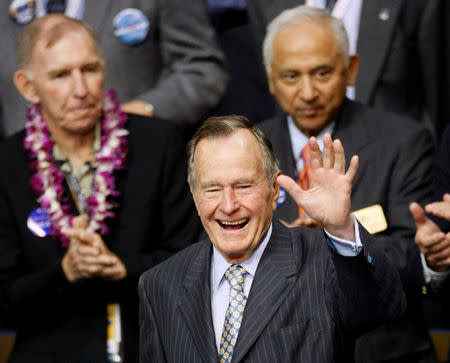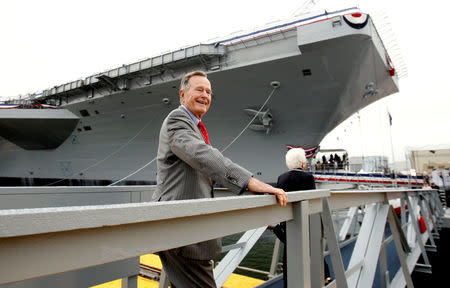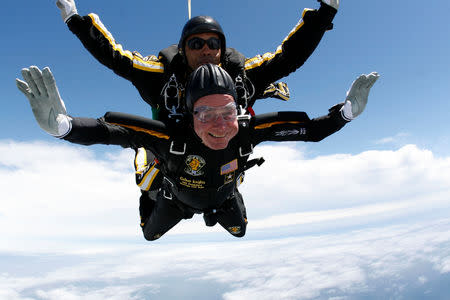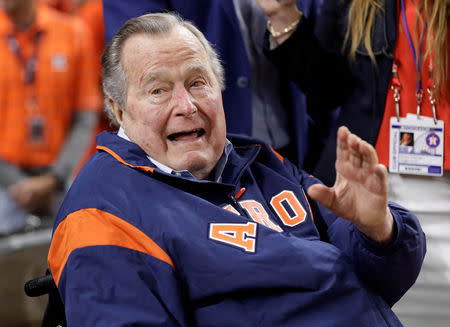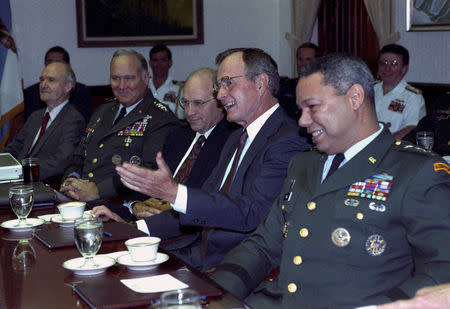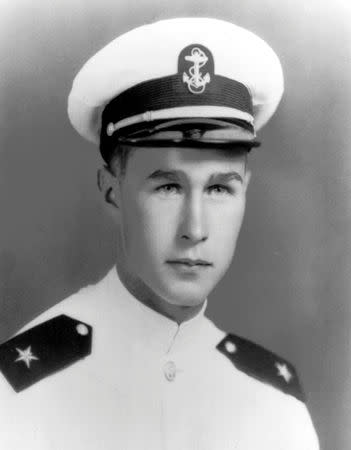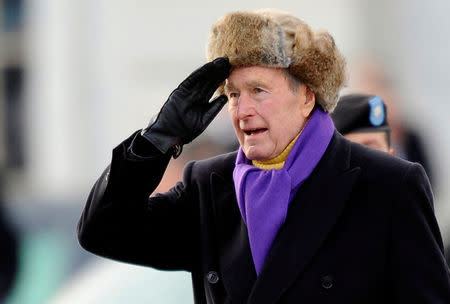Former U.S. President George H.W. Bush remembered for role in Cold War, Iraq
By Bill Trott
WASHINGTON (Reuters) - Tributes to former U.S. President George H.W. Bush, who died at the age of 94, poured in from around the world on Saturday as global leaders honored him for his role in helping to end the Cold War and reduce the danger of nuclear annihilation.
Bush, the 41st U.S. president, also routed President Saddam Hussein's Iraqi army in the 1991 Gulf War but lost his chance for a second term in the White House after breaking a no-new-taxes pledge.
"Many of my memories are linked to him," said Mikhail Gorbachev, the last leader of the Soviet Union, with whom Bush signed a strategic arms reduction treaty that scaled back the two countries' nuclear arsenals.
"We happened to work together in years of great changes. It was a dramatic time demanding huge responsibility from everyone," Russia's Interfax news agency cited Gorbachev as saying.
Speaking in Buenos Aires, U.S. President Donald Trump said Bush was "a high-quality man."
"He was a very fine man. I met him on numerous occasions. He was just a high quality man who truly loved his family. One thing that came through loud and clear, he was very proud of his family and very much loved his family. He was a terrific guy and he'll be missed. He led a full life, and a very exemplary life, too," Trump told reporters at a G20 summit.
Bush's death on Friday night was announced by longtime spokesman Jim McGrath. No further details about the circumstances of his death were immediately available.
The White House said a state funeral is being arranged at the National Cathedral in Washington. The president, who plans to attend the funeral with first lady Melania Trump, also designated a national day of mourning on Wednesday, Dec. 5, and ordered the lowering of the American flag for 30 days.
Former presidents remembered Bush as a leader of grace and humility. "His administration was marked by grace, civility and social conscience," Jimmy Carter, a Bush predecessor, said in a statement.
Barack Obama described Bush as "a patriot and humble servant" while Bill Clinton, who defeated Bush in the 1992 presidential election, recalled his "great long life of service, love and friendship."
Bush was the father of former President George W. Bush, who served two terms in the White House in the 2000s, and former Florida Governor Jeb Bush, who unsuccessfully sought the 2016 Republican nomination for president. Like his sons, he was a Republican.
His death came seven months after that of his wife, former first lady Barbara Bush, to whom he was married for 73 years. He was admitted to a Houston hospital with a blood infection that led to sepsis a day after her funeral in April.
"The entire Bush family is deeply grateful for 41's life and love, for the compassion of those who have cared and prayed for Dad, and for the condolences of our friends and fellow citizens," George W. Bush said in a statement.
A U.S. naval aviator during World War Two, the elder Bush also served as vice president for eight years during Ronald Reagan's two terms as president.
"His ethos of public service was the guiding thread of his life and an example to us all," said British Prime Minister Theresa May. "In navigating a peaceful end to the Cold War, he made the world a safer place for generations to come."
At the G20 summit in Buenos Aires, German Chancellor Angela Merkel recalled visiting him in the White House. "He was the father or one of the fathers of German reunification and we will never forget that," she said.
Russian President Vladimir Putin said Bush "faithfully served his country all his life - with a gun in his hand during the war years and in high government roles in peace time," according to Russian state news agency TASS.
EXTENSIVE POLITICAL RESUME
George Herbert Walker Bush, a Connecticut Yankee who came to Texas to be an oilman, died as the patriarch of a Republican political dynasty. He and George W. Bush were only the second father and son to hold the office of president, after John Adams (1797-1801) and John Quincy Adams (1825-1829).
His second son, Jeb, undertook his own campaign for the presidency in 2015 before dropping out. Bush's father, Prescott Bush, was a U.S. senator from Connecticut.
Bush had first sought the presidency in 1980, campaigning on experience gathered as a U.S. congressman from Texas, envoy to China, director of the Central Intelligence Agency, United Nations ambassador and chairman of the Republican National Committee.
Ronald Reagan, the former actor and California governor, vanquished Bush in the Republican primaries but chose him as his running mate, hoping Bush's reputation as a moderate would balance his own hard, conservative image.
After two terms in the Reagan White House, Bush ran for the presidency again in 1988 and defeated Massachusetts Democrat Michael Dukakis by winning 40 of the 50 states.
The high points of Bush's presidency included the end of the Cold War, which brought the dissolution of the Soviet Union and its hold on former Eastern Bloc countries.
"He was the only one of the world leaders at the time (who) did so much to overcome communism and help Poland," said Lech Walesa, the former head of Poland's Solidarity trade union who led protests and strikes that shook communist rule in the 1980s.
"He will remain in hearts and memory forever," Walesa said via Twitter.
Bush also won a decisive victory in ousting Saddam's Iraqi army from Kuwait, bringing him soaring popularity at home, and made progress on Middle East peace.
But Bush's foreign affairs victories were overshadowed by a stagnant economy at home. He broke his "read my lips" pledge not to raise taxes and lost his 1992 re-election bid to Clinton.
Bush, who was born on June 12, 1924, in Milton, Massachusetts, grew up wealthy, attending elite schools but putting off college so he could enlist in the Navy at 18. He flew 58 missions off aircraft carriers in World War Two and survived being shot down over the Pacific Ocean.
After returning from the war, he married Barbara Pierce, with whom he would have six children. After he graduated from Yale University on an accelerated schedule, the Bushes headed to the oil fields of West Texas.
It was there that Bush became involved in politics, first losing a U.S. Senate race in 1964 before winning election to the U.S. House of Representatives in 1966.
After two terms and another failed Senate bid in 1970, he was appointed by President Richard Nixon as U.S. ambassador to the United Nations. In 1974, President Gerald Ford made him an envoy to China and later director of the CIA.
Bush did not endorse fellow Republican Trump, the eventual winner of the 2016 presidential election who attacked both Jeb and George W. Bush during his campaign. He did not publicly say whom he voted for in the election, but a source told CNN he went for Trump's Democratic opponent, Hillary Clinton.
Bush did send Trump a letter in January 2017 saying he would not be able to attend his inauguration because of health concerns, but wishing him the best.
(Reporting by Bill Trott and David Morgan in Washington, Steve Gorman in Los Angeles, Roberta Rampton in Buenos Aires, Mark Heinrich in London, Andrew Osborn in Moscow and Marcin Goclowski in Warsaw; Editing by Mark Heinrich, Matthew Lewis and Alistair Bell)

